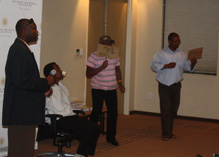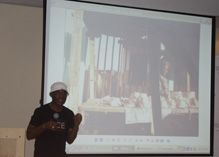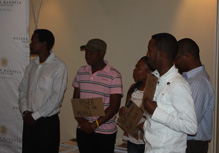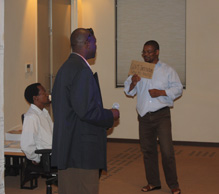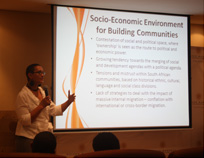 Implementing Partner Bea Abrahams presents at the National Consultative Meeting
Implementing Partner Bea Abrahams presents at the National Consultative MeetingMarch 15, 2010 – The Nelson Mandela Foundation convened a National Consultative Meeting to reflect on the challenges and opportunities for building better relationships between South African and migrant communities, following their successful completion of 25 community dialogues in five provinces.
The National Consultative Meeting was attended by representatives of national and provincial government departments, the South African Human Rights Commission, the United Nations High Commission for Refugees, representatives of international and national non-government organisations, academic institutions, local councillors, community and faith-based organisations as well as the Foundation’s operational partners.
Having reached the half-way mark in its pilot programme to promote social cohesion, the Foundation’s Implementing Partners and provincial facilitation teams used the occasion to highlight some of the key issues and trends emerging from the community conversations; to showcase the successes they have achieved; and to consider improved strategies for defusing growing social instability, towards the establishment of more cohesive communities.
Opening the national meeting, the Foundation’s CEO Achmat Dangor said he felt the dialogue teams were “pioneering an art of listening” within the communities they worked in.
“The true art of dialogue is listening and truly listening,” said Dangor.
“In Africa there is too much talking and not enough listening. You are pioneering an art of listening in those communities you work in.
“We wish you well and hope that this methodology, which is being pioneered now, will be spread across the continent,” Dangor added.
Looking back on the community conversations held in Gauteng, the Western Cape, the Eastern Cape, KwaZulu-Natal and Mpumalanga, the Foundation’s Implementing Partners, Bea Abrahams and Ken Mutuma, identified some of the key stressors contributing to communities’ anger and frustration, often resulting in violence and the fragmentation of community cohesion. Principal among these is the growing economic gap between rich and poor and the profound and enduring effects this has on communities’ ability to feel that they are part of social, economic and political decision-making processes.
Experiences of exclusion and marginalisation fuel an increasing perception in impoverished communities that government is not doing enough to protect their interests and to address the challenges of housing, jobs, economic opportunity and access to basic services, which they face on a daily basis.
The past few years has seen a significant spike in the number of South Africans migrating, in search of jobs and opportunities for economic betterment, from under-resourced provinces such as the Eastern Cape and North West Province to the major towns in Gauteng, the Western Cape and KwaZulu-Natal. While this influx clearly places additional strain on an already over-burdened basic service delivery system, there is little evidence of government-led strategies to deal with increased internal migration trends. Instead, local communities increasingly turn their anger and frustration towards foreign nationals, perceiving them to be the source of their social and economic difficulties.
A combination of factors, including wide-spread perceptions of a lack, and mistrust, of political and local level leadership to resolve conflicts in the communities; the use of language to demonise or exclude others; and inadequate mechanisms to promote healing, conspire to create a fertile breeding ground for xenophobic attitudes.
Mutuma added that while it was difficult to take a community on a journey of transformation when there were often community members whose interests were at odds with the dialogues’ aims, there had been positive steps. The profile and standing of the Nelson Mandela Foundation had opened a space for dialogue in a volatile context. While there are challenges still facing the communities, the programme was proving to be a valuable one.
Dialogue teams from KwaZulu-Natal, the Eastern Cape, Mpumalanga, the Western Cape and Gauteng provided feedback on the conversations in their areas and some of the successes and challenges that had come out of the dialogue process.
In each case, the teams reported positive progress as a result of the community conversations in their areas.
“The community started to envisage a future together,” said Gugu Shelembe from the KwaZulu-Natal team, which conducts community conversations in Albert Park and Cato Manor. “The conversations have led to the development of independent projects in the area, such as the creation of a language centre, a community radio and a community newspaper.”
Shelembe said that as a result of the dialogue process, the community had begun to engage in a cultural exchange, embarking on a skills audit and skills transfer process to help community members learn from each other.
Rodrick Chimombe from the Eastern Cape said that as far as the way forward was concerned, it was important to continue with the dialogue programme to provide communities with the capacity to address the challenges they face.
Zoe Nkongolo from the Western Cape said there was still a long way to go before the communities in the Western Cape could take over the process, but that continued dialogues by the Foundation, as well as interventions by other organisations in the area, were helping to build capacity in the communities.
“This programme provides the building blocks to develop and implement a comprehensive, long-term, community-based strategy to transform conflict and to start building sustainable peace through reconciliation, institution building and healing,” Abrahams said. “It requires a deep understanding of conflict dynamics, mediation, negotiation and conflict resolutions skills. Basic skills in emotional containment and trauma management are also required to facilitate healing.”
Abrahams said that above all there was a “need for the development of an early warning system” to head off further outbreaks of violence.
“One of the things we are looking at as the Foundation is partnering with existing structures within communities, rather than continually forming new structures,” said Diaho, Head of the Foundation’s Dialogue Programme. “When we first went into the communities we were intent on providing a facilitatory and catalytic role for those communities to start addressing their own problems. While we have done that, we’ve realised in the past 18 months that there is so much more we can do.”
